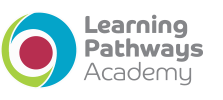We spoke to Helen and Gabrielle about the impact that Clicker is having on teaching and learning across the Learning Pathways Academy Trust in Essex.
Could you tell us a bit about your schools?
Helen
I’m the SENCo at White Hall Academy in sunny Clacton-on-Sea. We’re a very large primary school with a nursery and have over 700 pupils on roll. About a third of the school have special educational needs, with a high proportion of children with diagnosed disorders (autism, ADHD etc), a high proportion of pupils eligible for Pupil Premium funding, and over half of the school have experienced some form of trauma or needed some kind of social and emotional support. We also have a very high percentage of children in care. So overall, we’ve got a very broad range of needs here.
Gabrielle
I’m Head of Inclusion at Lyons Hall School. We have 562 primary pupils, 17 of which have EHCPs, with about 15% on the SEN register. We also have a wide range of needs to support across the school.
What did you hope that Clicker would help you to achieve?
Gabrielle
We wanted to give all of our children a way to record their ideas and demonstrate their learning. We wanted to take away their literacy barriers so that they could be more independent and less reliant on an adult. One of the major reasons that we upgraded to the latest version was the ability to have Clicker on our iPads and Chromebooks, which enables us to deliver that high quality provision across the school.
Helen
I really wanted to use Clicker to empower our LSAs; to give them an additional tool to use with children who were struggling. As Gabrielle said, it was focussing on those children who needed that extra support with writing and capturing their ideas.
How did you get started with Clicker?
Gabrielle
There are only three schools in our academy trust, and we’re in the fortunate position of being able to regularly collaborate at trust meetings. We chose to make Clicker implementation a focus across the trust.
We initially got started by watching the on-demand introduction webinar together in a meeting.
After that, we naturally progressed with Clicker usage in some areas really well, so for example, we felt very confident about how we were using it as a writing tool for Key Stage 2. However, we weren’t using it as much with the younger children, so I wanted our next focus at Lyons Hall to be on this age group. Whereas at White Hall, Helen has a lot of pupils with speech and language needs, so they made that their key area to explore next.
This approach has worked really well for us as a trust, as we’ve been able to go away and use Clicker with a focussed group of children in these particular areas, and then feed back to each other what we’ve learned!
Helen
I was particularly looking for ways that we could support some of our older children with speech and language issues. We have a room called the Rainbow Room at school which is for a small group of children who have EHCPs at a very high needs level (band 4 and above). Speech is a big area of their development and really impacting on their learning across the curriculum. We wanted to explore how the Clicker Talk app could help back up the recommendations of the speech and language therapist, in a way that would be much more engaging for them than bits of paper or worksheets.
How are you using Clicker to support writing?
Gabrielle
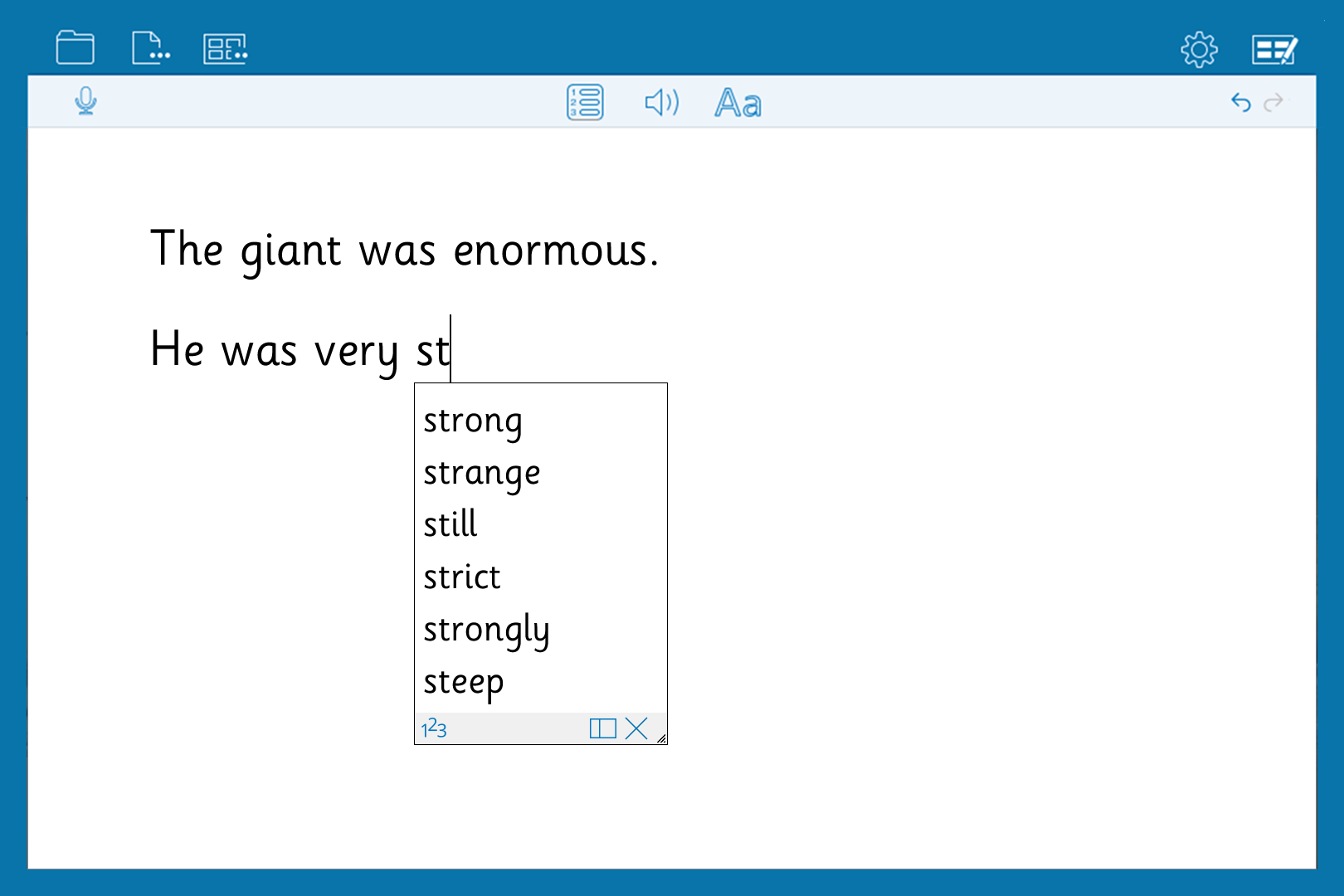
Importantly, it’s really dependent on the child’s preferences. If it’s a short piece of writing, they might just hand write – some children want to hand write but they use Clicker’s talking spell checker and word predictor to help them get the right spelling, so the iPad is there for them to listen and find the right words, then copy this into their books. Others like to type it all out initially in Clicker to avoid cognitive overload whilst getting their ideas down, then once it’s written and they’ve used Clicker to help them edit it, they’ll hand write a ‘best copy’ at the end. It’s completely adaptable to the children’s needs and how they prefer to work, but sometimes they’re directed to use it if they need a little push!
Clicker gives the children that crucial ownership of the writing process - if a child really likes their handwriting and wants to write and be ‘the same’ as the rest of the class, they use Clicker for support alongside this, or if it’s a longer piece of writing, or they would rather write it all out in Clicker, they can do that. It’s very flexible.
What impact has Clicker had on teaching and learning in your schools?
Gabrielle
Clicker’s had a huge impact… it’s life-changing for some children. With Clicker’s help they can actively participate alongside their peers, they can record their ideas, and they can show what they know.
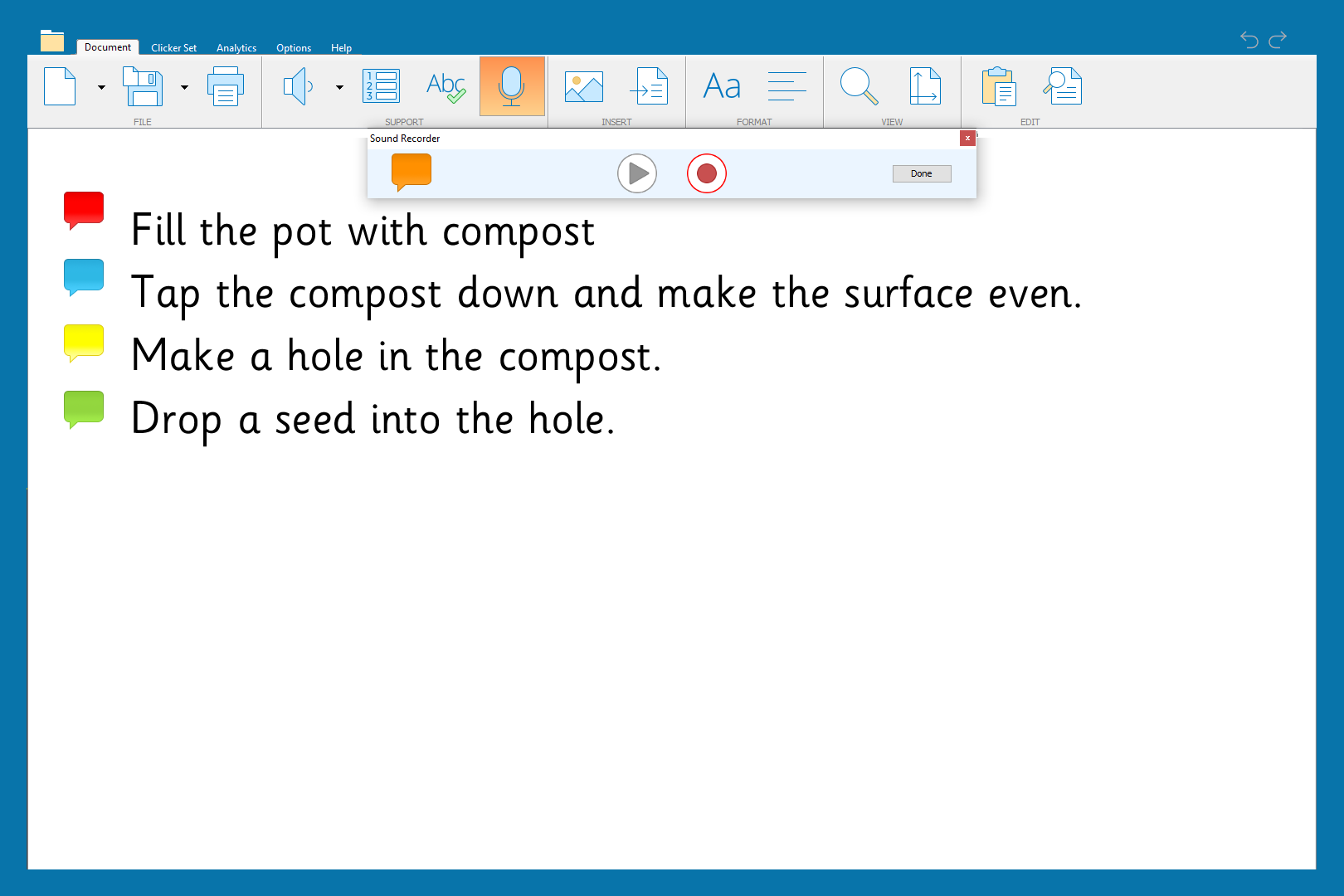
We’ve got a boy in Year 4 – his reading age has come on but at the start of the year he’d only just got a reading age (around 4.8), but he’s very bright, always with so much to say and confident with things like drawing and telling you a story, but struggles when it comes to reading and writing. Being able to use the Voice Notes tool to record his ideas and share what he knew without writing being a barrier was really powerful. As his confidence has grown, he’s moved from dictating his ideas to typing and using the Predictor and Word Banks, and even to just independently hand writing some tasks, so the impact has been enormous for him. His understanding of subjects was age expected, it was just his writing ability that was holding him back, which was also impacting on his self-esteem, but his progress with Clicker has been incredible.
Helen
In our Rainbow Room children use Clicker daily - they need that high level of engagement to keep them focussed. It can be difficult to get more than five minutes of engagement without Clicker, but when we use it, we can keep them focussed for a significantly longer period of time.
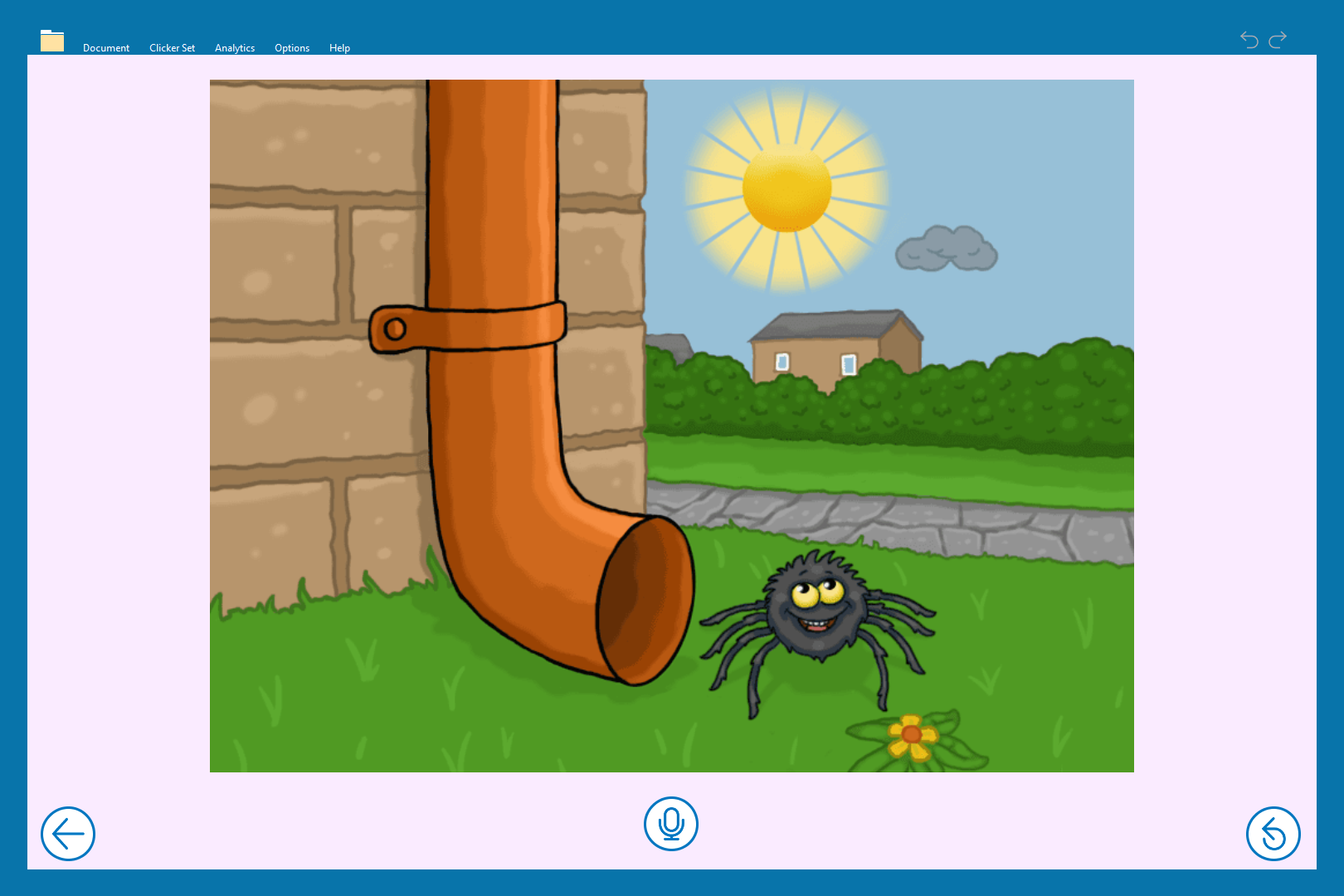
We have one child in Year 5 with a significant speech difficulty, and she uses Clicker as part of her daily speech programme. She particularly struggles with the beginnings and endings of words. As you can imagine, it’s very difficult to understand her. So, we used Clicker Talk - the specific resource that springs to mind is ‘Incy Wincy Spider’ and the other nursery rhyme sets - using those familiar rhymes to build her confidence with those word sounds. Before that, she just wasn’t used to hearing herself speak, so having that record function to put her own words to the picture prompts and then play it back to herself enabled her to hear really clearly what it was that she was missing when she said certain words. This has really helped her speech to develop and now, although she still has difficulties with some word beginnings and endings, her speech is much clearer – she’s so much more aware of how she sounds, so she’s making an effort to produce that clear speech… we’ve seen massive, massive improvements.
How useful do you find LearningGrids - our bank of ready-made Clicker resources?
Helen
Very! We nearly always start with the ready-made resources and adapt them as needed - whilst staff are getting to grips with Clicker they find it really useful to explore what’s already there to support their learners. The pre-made Talk Sets are particularly valuable, being able to record the children’s words against the pictures for different topics, we really appreciate that there are so many resources just ‘there’ ready to use!
There’s support and resources for History, for Geography, for Science… Clicker’s not just for English or Literacy, it’s for everything.
Gabrielle
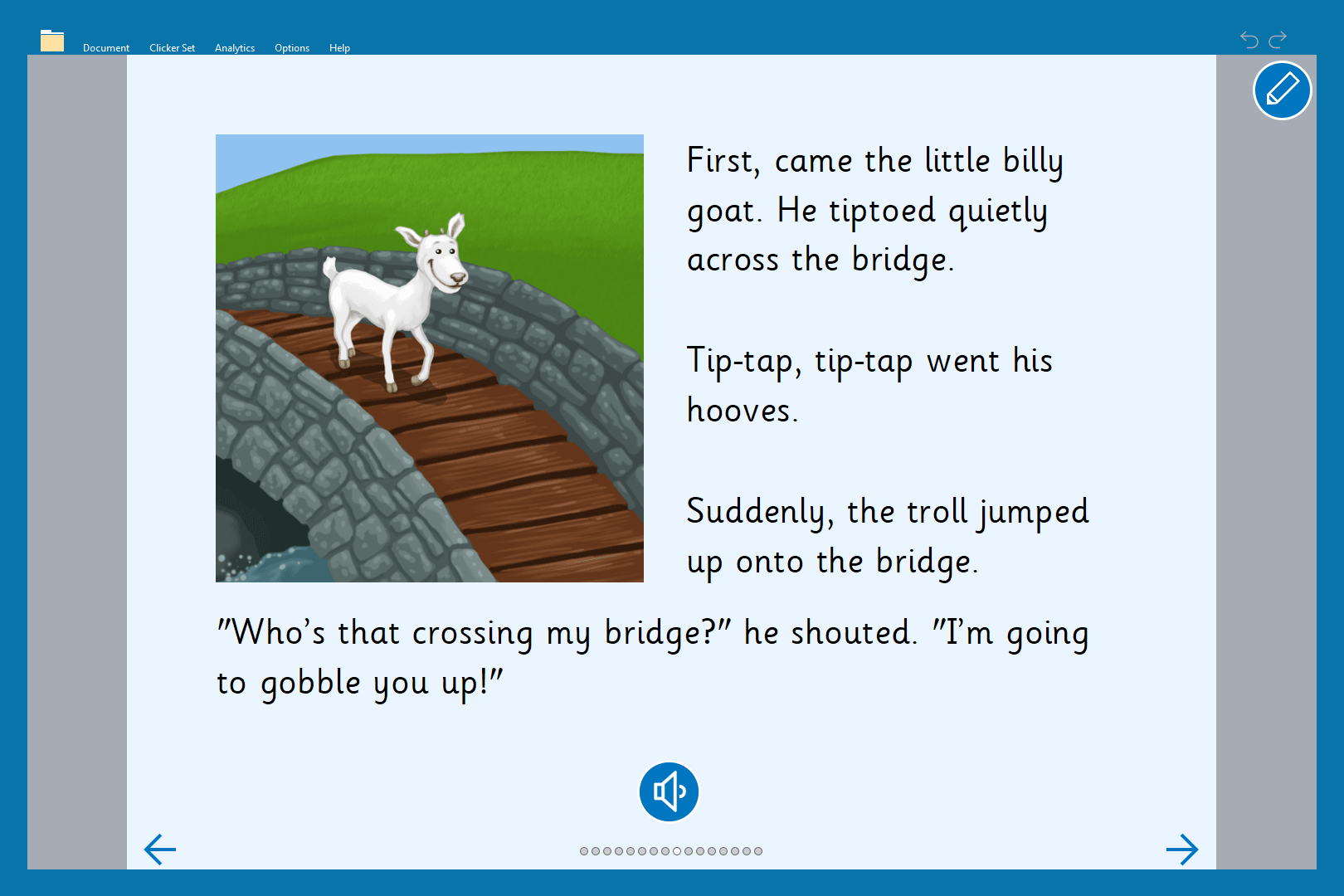
We’ve done lots of training with our teachers and LSAs so that they know how to make their own resources, but they’ll always check LearningGrids first to see if there’s anything that’s already made that they can use – the talking books and linked resources are used a lot for one-to-one work, but they are also happy to make their own for specific class topics.
What training have you had/done?
Helen
We’ve made good use of the free training webinars Crick offer, they’re so handy to sign-post to staff as a reminder of how to do certain things or use specific features. I’ve also put together my own guides to help the team get started.
Gabrielle
To begin with, some teachers needed support on how to use it, so I’ve done some modelling for them in our meetings to show how it can be used to support pupils’ individual targets, and now they’re making those connections themselves and seeing when Clicker can be used to support children based on their needs.
We’ve also found that the children who are confident using it make great Clicker helpers! They really like going and showing another child or staff member how to use it and having the responsibility of being a ‘Clicker expert’.
For those children using Clicker at home to support homework tasks, we’ve done training sessions where we invited the parents in, one-to-one workshops with parents and their children, SEN coffee mornings… all of which have really helped to build their confidence.
What’s the best thing about Clicker?
Gabrielle
That’s a tough one! The versatility, the user-friendly tools, the way it empowers our children to achieve success in their writing, the confidence boost Clicker gives them… it’s hard to pick just one!
I think that for lots of learners it’s the fact that Clicker enables them to work more independently instead of having an adult next to them. Unfortunately, it’s becoming a reality that less adult support is available for these pupils, so having Clicker bridges that gap and helps everyone to achieve.
Helen
Clicker is just so different from anything else out there. For what you get in Clicker – you might be able to find other products that enable you to do certain aspects, like the talking books or recording activities, but with Clicker, everything’s there all in one place, all child-friendly and accessible – that is just amazing. And I have to mention the bank of ready-made resources again too!
Gabrielle

There’s also the mind mapping tool for organisation of ideas, the different levels of scaffolding in those free resources Helen mentioned – it’s having one tool that can support children with many different literacy difficulties across the school.
Future plans for Clicker?
Gabrielle
We really want to build on what we’ve learnt so far and the feedback from each focus area to make sure we’re utilising it to its full potential. We also want to introduce children to it as early as possible so that they can become familiar with it at a young age and benefit from that scaffolding right up until Year 6.
Helen
Yes, we’re still not fully using all that Clicker has to offer, so our focus at White Hall next year will be trying to make sure it’s used as often as possible within our classrooms.
What would you say to schools considering whether to invest in Clicker?
Helen
I’ve been a SENCo for a long time and year on year, specialist teachers kept saying “Get Clicker, use Clicker, it’s brilliant, it’s fantastic” and over the years that advice has never altered. Whenever I’ve come across anybody who uses Clicker, that’s what I hear – it’s just an amazing tool.
Gabrielle
Yes, it’s an investment, but as Helen says, it’s worth it. Once you have it you can do so many different things with it, and it’s so empowering for our pupils.
